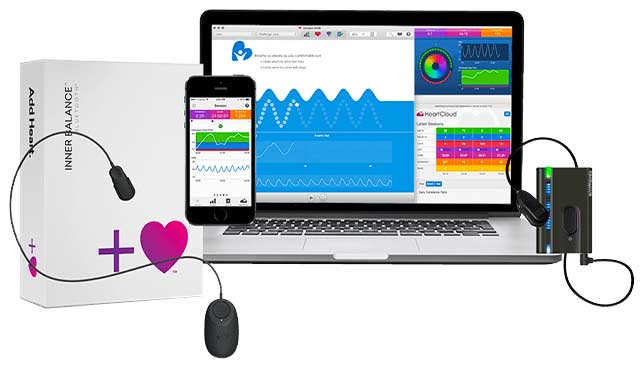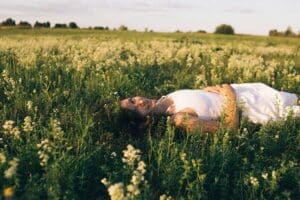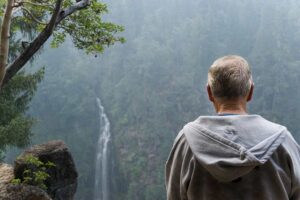Will you fall down this year?
Don’t get tripped up! Don’t fall down. How to prevent falling. According to the CDC the seventh most common cause of death among older adults is “unintentional injuries.” The biggest category? Falling. Each year approximately 30 thousand Americans of the age of 65 or older die from, you guessed it, falling. (both my parents died after falling) The wider impact of these injuries and falls, death excluded is almost
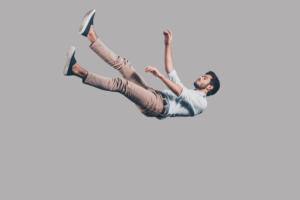
unmeasurable. Loss of ability to walk, cook, exercise, drive etc. are commonplace following falls. Many people lose their ability to get out of the house, to socialize or travel for basic needs. The impact can be dramatic.
- One in 5 falls results in serious injury such as broken bones or head trauma.
- 3 million older people per year are treated in ER visits for injuries related to falling.
- Each year over 80,000 people are hospitalized because of falling. Usually with a head or hip injury.
- Every year at least 300,000 people are hospitalized for hip fractures.
- 95% of these hip fractures are caused by falls.
- Falling is the single biggest cause of traumatic brain injury.
- The cost for treating these falling injuries reaches upwards of $50 billion/year paid for mostly by Medicare and Medicaid.
Even if no significant injury is sustained, sometimes people become so afraid of falling that they reduce their activities significantly leading to increased weakness and then again, increased chances of falling.
Most falls are caused by a combination of causes that range from lower body weakness to vitamin d deficiency.
Some other causes of falling include:
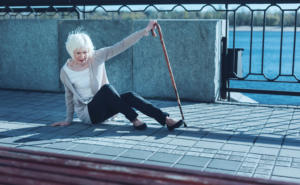
- Use of medicines -(does your medicine make you dizzy or have blurry vision? )
- Eyesight problems
- Footwear that does not fit
- Home hazards like uneven steps and rugs.
- Neuropathy or loss of sensation and proprioception in the feet.
One of my patients just slipped on dog poop inside her house related to a new puppy but the most common cause of falling is loss balance. This is what we are going to focus on today. How to prevent loss of balance. I hope you will find some of my suggestions helpful. The two areas we are focusing on are:
Balance and Weight training to prevent falls:
Weight training is critical to maintain body strength and if done properly can help maintain bone density as well as increase the lower body’s ability to recover from small slips and “out of balance incidents” as I am going to call them. Im sure you know what I mean, taking the step and the slight loss of balance but you recover, or you don’t?
Simple weight training suggestions:
Working out with free weights generally helps improve balance better than machine workouts. Asking your body to maintain a good strong stance while lifting and working with free weights will strengthen your “muscles of reaction” and reflexes. It may be helpful for you to start working with a personal trainer to get started. If you are familiar with free weight work outs that’s great. Work up to as much weight as you can comfortably manage. Holding the extra weight will strengthen the lower body and the core to help reduce and recover from near falls.
Building balance:
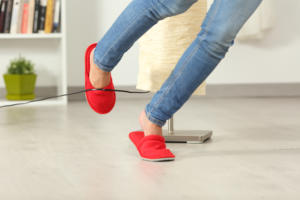
This is the other side of the coin of preventing falls. This may require some work. If you don’t live in a tropical area where you can go paddle boarding everyday you can try something as simple as standing on one foot. First make sure you are in a safe area and have something to grab onto if you falter. Try standing on one foot as long as you can then switch to the other. Feel your ankles wobble? This is your body building a strong stance. This exercise, if you haven’t done it can be challenging for even very “fit” individuals. Go back and forth a few times. Over a few days or weeks, you should notice a considerable difference in your ability to maintain balance on one foot. Don’t underestimate this exercise. It is very powerful for staying on your feet when you “slip up.” Give it a try and send me a note on how it went. Feels pretty good doesn’t it?
Bone Density:
Lastly, be sure to have your bone density monitored and have your vitamin D levels checked. Once you lose bone density all the medicine they give to cure osteoporosis or thin bones causes as many or more problems than it cures. The best solution is to take care of bone density while you have it. It is suspected that many falls involve hip fractures that happen before the fall. Don’ let this happen you you.
As a closing note, I have just started reading an excellent book on building your core in the back, hamstrings and calves. It is excellent for balance as well as reducing back pain. It is called “Foundation” by Dr. Eric Goodman and Peter Park. It can be found on Amazon here.
I have also really enjoyed reading and working with the books of one of my patients, Chi Running and Chi Walking. Detailed expert knowledge of the body is outlined in a clear format to help prevent injury while walking, hiking or running. Check them out here.
In the mean time, please send me a note and let me know how your balance work is going. Thanks!

